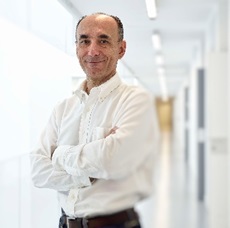Human auto-antibodies neutralizing type I interferons: strong, common, and universal determinants of life-threatening viral infections
This research on this project is conducted by a Franco-American team led jointly by Dr. Aurélie Cobat and Professor Jean-Laurent Casanova within the Laboratory of Human Genetics of Infectious Diseases at Institut Imagine in Paris (University Paris Cité/INSERM, Necker Hospital for Sick Children)
and at the Rockefeller University in New York.
Duration of the project: 2024-2027
Background
There is immense inter-individual clinical variability during infection by any microbe, ranging from silent elimination to lethal disease. The importance of monogenic defects governing immunity to infection is already well established for lethal infections, especially in children. In particular, monogenic defects governing type I interferons (IFN) immunity underlie severe viral diseases, including herpes simplex encephalitis (HSE), critical influenza or COVID-19 pneumonia, and adverse reactions to live-attenuated viral vaccines.
The study of these monogenic defects has led to the discovery of their “autoimmune phenocopies”, i.e., the presence of auto-antibodies (auto-Abs) neutralizing type I IFNs. Remarkably, auto-Abs neutralizing type I IFNs underlie an unprecedented proportion of cases of a growing range of severe viral diseases, including ~5% of cases of severe influenza pneumonia, ~15% of cases of critical COVID-19 pneumonia, and up to 40% of cases of West Nile Virus encephalitis, particularly in middle-aged and elderly adults. These auto-Abs are common in the general population, with a prevalence around 0.3-1% under the age of 65 years, with a sharp increase from the age of 65 years onward, reaching ~4-7% over 80 years old, and amounting to > 100 million carriers worldwide.
Objectives
To recruit cohorts of individuals carrying auto-Abs neutralizing type I IFNs or at high risk of carrying such auto-Abs, in particular patients with severe viral infections of the brain and lungs, and elderly individuals at an international level.
To evaluate the risk of severe viral disease in carriers of these auto-Abs, according to the virus, affected organ (brain vs. lung), ancestry, gender, age of the patients, and ad hoc features of the infections (primary vs. secondary infection vs. post-vaccination).
To search for rare and common gene defects underlying these auto-Abs by whole exome (WES) and whole genome sequencing (WGS), using a cutting-edge strategy developed to analyze such data.
The goal of this project is to determine the full range of consequences of auto-Abs neutralizing type I IFNs on severe viral infections and to decipher their causes. It will benefit from various cohorts of patients recruited over the last 30 years and will provide novel and unique insights into the pathogenesis of severe viral diseases, clarifying the pathogenesis of auto-Abs and paving the way for precision medicine.
Fields of research
Autoimmunity, type I Interferons, human genetics, inborn errors, risk factors, severe viral diseases, encephalitis, pneumonia, precision medicine.

Aurélie Cobat
is Assistant Professor at the National Institute for Health and Medical Research (INSERM) in the Laboratory of Human Genetics of Infectious Diseases (HGID), where she leads the computational genetics division of the lab, and a Guest Investigator at the Rockefeller University in the St. Giles HGID laboratory. She holds a medical degree in public health and a PhD in statistical genetics and genetic epidemiology. She has played a pivotal role in the identification of the main human susceptibility/resistance determinants controlling the response to infection by various microbes, in particular viruses. She is also developing statistical methods to improve and optimize the analysis of NGS data. She was intensely involved in the discovery of the first genetic causes of severe COVID-19 and the discovery of the role of autoantibodies in type I IFN Immunity.

Jean-Laurent Casanova
is the Levy Family Professor at The Rockefeller University, Investigator of the Howard Hughes Medical Institute, and Professor at the Necker Hospital for Sick Children, University of Paris Cité. He is a pediatrician and immunologist by training, and in practice has become a human geneticist studying the pathogenesis of infectious diseases, seeking to identify monogenic and digenic disorders that selectively compromise immunity to a single infection in otherwise healthy children and adults. He has published over 750 original papers and 265 reviews and editorials, and has been ranked as one of the world’s most highly cited researchers by Clarivate every year since 2014. He is a member of the National Academy of Sciences and the National Academy of Medicine of the USA.